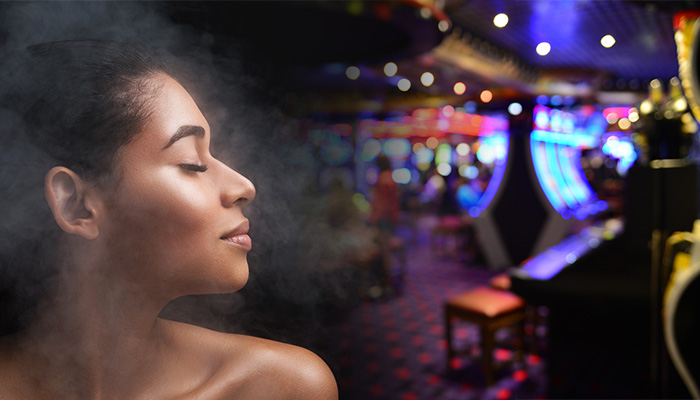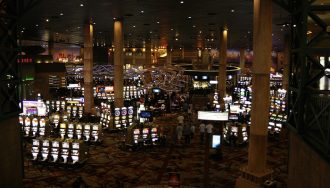Oxygen in Casinos
 Oxygen in Casinos
Oxygen in Casinos
- Oxygen in Casinos
- Do Casinos Pump Oxygen?
- Why is Oxygen Pumping Dangerous?
- Tricks Casinos Use
- Do Casinos Pump Smells?
- What’s The Temperature in Casinos?
- Frequently Asked Questions
Head to a land-based casino in Vegas, and you’ll feel as though you’ve been transported to a different world. Bright lights, glamor – and lots of money – surround you from the second you enter. Many people have heard that there’s special oxygen pumped into casinos – something done by casinos in an attempt to keep players feeling calm, relaxed, and cool. But is this true? On this page we investigate and uncover the truth.
Do Casinos Pump Oxygen?
No; the reality is that casinos in Las Vegas do not pump oxygen. While it’s true that all land-based casinos use a wide variety of tricks to keep players alert and gambling for longer periods of time, pumping in oxygen is not one of the techniques used.
Doing so would actually be incredibly dangerous – and it’s against the law. While some land-based casinos in the past considered this technique, it was thought to be ineffective – and it’s nothing more than a myth. On this page we’ll look at where the myth originated from, and the tricks casinos do use.
Where Did the “Casinos Pump Oxygen” Myth Come From?
Interestingly, the myth that casinos pump pure oxygen originated in a novel called Fools Die. It was written by a writer called Mario Puzo. In the book, a fictional casino called the Hotel Xanadu, in Las Vegas, starts to pump oxygen to keep players feeling alert and awake, in an attempt to make them gamble for longer periods of time.
Since the novel’s release, critics and cynics have widely circulated the myth, in an attempt to discredit land-based casinos. Many players also believe that casinos use all the dirty tricks they can to maximize revenue, but the reality is, oxygen pumping is just a myth.
However, some players claim to be able to feel that casino oxygen levels are different than in other buildings. Why is this? Well, land-based casinos are generally very well air-conditioned. This is to ensure players feel comfortable at all times. As a result, some players may imagine that the air they’re breathing is “purer” – but the reality is that there’s no extra oxygen; it’s simply air conditioned!
Some people may also be getting conventional air circulation systems mixed up with pumped oxygen. Casinos – like all large buildings – need to ensure they’re constantly replenishing the air supply. This means air is pumped into the casino – but the oxygen level of this air is no different to the air you’d breathe outside.
The Risks of Pumping Oxygen
We already know that casinos don’t pump oxygen; this is nothing more than an urban myth. However, even if they were to do so, it would be incredibly dangerous – and, in most places in the world, illegal, too. While increased oxygen levels wouldn’t cause health problems for the vast majority of people, it would pose a significant fire risk.
With that being said, oxygen toxicity is a danger – and this can be caused when too much oxygen makes its way into the lungs. Symptoms can include shortness of breath, intense coughing – and, in rare cases, even death.
If pure or enriched oxygen is pumped directly into a room – and a fire starts – regardless of whether the fire is big or small, the increased oxygen will raise both the intensity of the fire and the heat. In some scenarios, this could even cause an explosion.
Most land-based casinos in the world allow patrons to smoke cigarettes; in the “right” conditions, a lit cigarette could be enough to start a fire were pure oxygen being pumped in, and this is yet another reason why oxygen simply isn’t pumped into a casino.
What Casinos Do Instead
Just because oxygen pumping in casinos turned out to be a myth doesn’t mean casinos aren’t using a wide variety of tricks to entice players to gamble more. In fact, land-based casinos spend millions of dollars during development to make sure their buildings are “optimized” for increased player play time.
After all, the longer a player stays in a casino, the more money they are likely to spend. Because of this, most casinos work hard to encourage players to stay for as long as possible. Below, we will look at some of the most common methods used by casinos.
| Method | Why It’s Done |
|---|---|
| No Clocks | Almost all land-based casinos hide – or simply don’t show – the current time. When human beings don’t see a physical representation of time, they’re more likely to continue gambling – and spend more money. |
| No Windows | Most casinos don’t have windows – for a good reason. With windows, players would be able to see the passing of day to night, or vice versa. Casinos want players to stay as long as possible, so the lack of windows is a psychological tool to make players stay longer. |
| Near Misses | Whenever you play an electric-powered casino game, such as a slot machine, you’ll encounter a number of “near misses.” These are designed to give you the impression that you were close to winning big, but just missed it. This encourages players to keep playing to try and hit the win. |
| Chips Rather Than Cash | For more than a century, land-based casinos have used physical chips rather than cash. While there are several reasons behind this move, the primary goal is to reduce the value of money in the head of the gambler. It’s a lot easier to throw chips on a table than it is real money. |
| Offer Freebies | Some land-based casinos – especially those in major cities like Vegas – will offer freebies to losing players, or high-rollers. This helps to encourage the gambler to come back – or keep trying to hit wins – as it makes them think they’re getting a good deal, even if they’re losing. |
| Vibrant Wins | When a player wins – regardless of whether it’s a small or big amount – you can expect to see flashing lights, blaring music and coins clinking on the slot machines. This is known as the “winner effect” and it’s designed to make players feel as though they’re winning more money than they actually are. |
| High-Value Chips | Some casinos, mainly in the US, will try to convince players to swap their small-value chips for high-value ones. This is because the casinos want players to stake larger amounts of money, and this is much easier when a player is in possession of high-value chips. |
Do Casinos Pump Smells?
Ask any player who’s been to a Vegas casino what they remember, and they’ll probably tell you the smell of the casino. It’s a hallmark feature of virtually all land-based casinos in Vegas; the distinctive scent that patrons notice immediately after they enter the establishment. While some players find scents overwhelming, most react positively – and it’s actually an interesting psychological tactic, too.
In the early 90s, a study was carried out by a researcher called Dr. Alan Hirsch. Along with his team, he looked at the differences in “coin in” (money gambled) in a room in a casino that was using no scent, and then carried out the same study a week later using a special scent. The results were staggering; the scented area showed a 45.01% increase in the amount of money that was gambled by players!
Some regular Vegas players have even reported that they keep coming back to the same casino because of the way it smells. Dedicated websites even exist where you can buy scented candles and bath soaps – specific to individual casinos in the US!
While most casinos try to maintain the same smell throughout the property, some will mix things up and dedicate specific smells to specific rooms. This is usually done when they’re experimenting with new scents and want to see how players will react to them.
Air Temperature in Casinos
One of the most common complaints new gamblers have about land-based casinos is the temperature; many players find it quite cold, although this is actually a deliberate move by the casinos. Researchers found that the optimal gambling temperature is 296 Kelvin; studies show that at this temperature, which is just over 73 Fahrenheit, players feel most relaxed – and they’re most likely to increase their spending levels at the casino.
Most casinos use huge air conditioning systems to constantly monitor – and cool – all the rooms within the casino, and this resulting power bill is actually one of the biggest expenses for casinos.
Thankfully, casinos realize that cool, cold rooms aren’t for everyone – and this is why, even when a dress code is enforced, patrons are usually able to wear a coat or jacket without any problems. Some land-based casinos will even adjust the temperature in private rooms if you feel it’s too hot or cold.




